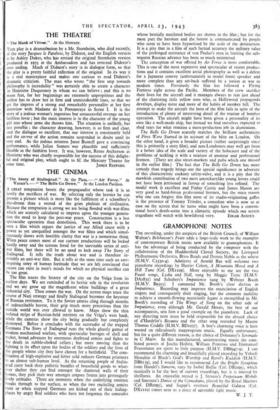GRAMOPHONE NOTES
THE recording, under the auspices of the British Council. of William Walton's Belshazzar's Feast adds a large-scale work to the examples of contemporary British music now available to gramophonists. It has the advantage of being conducted by the composer with the collaboration of the Huddersfield Choral Society, the Liverpool Philharmonic Orchestra, Brass Bands and Dennis Noble as the soloist (H.M.V. C3330-4). Admirers of Arnold Bax will welcome two pianoforte recordings by Harriet Cohen, A Mountain Mood and A Hill Tune (Col. DX1109). More enjoyable to me are the two Faure songs, Lydia and Nell, sung by Maggie Teytc (H.M.V. DA1831) and Schubert's Impatience sung by Webster Booth (H.M.V. B9315). I commend Mr. Booth's clear diction in Impatience. Recording may improve the enunciation of English singers and consequently their singing, but the common inability to achieve a smooth-flowing musicianly legato is exemplified in Mr. Booth's recording of The Wings of Song on the other side of Impatience, even although Mr. Gerald Moorc, the best of our accompanists, sets him a good example on the pianoforte. Lack of any directing taste must be held responsible for the absurd choice of d'Hardelot's Because and the other song" recorded by Master Thomas Criddle (H.M.V. BDro37). A boy's charming voice is here wasted on ridiculously inappropriate music. Equally unfortunate, but for a quite different reason, is the choice of Dohnanyi's Serenade in C Major. In this manufactured, uninteresting music the com- bined powers of Jascha Heifetz, William Primrose and Emmanuel Feuermann are spent to little purpose (H.M.V. DB8947-9). I can recommend the charming and beautifully played recording by Yehudi Menuhin of Bloch's God's Worship and Ravel's Kaddish (H.M.V. DB6139), and I would like to recommend Let the Bright Seraphim from Handel's Samson, sung by Isobel Baillie (Col. DB2095), which musically is far the best of current recordings, but it is marred by shrillness. An enjoyable record is J. Strauss's Perpetuum Mobile and Smetana's Dance of the Comedians, played by the Royal Marines (Col. DB2095), and Suppe's overture Beautiful Galatea (Col. DXx to) comes next as a piece of agreeable light music.
W. J. T.


























 Previous page
Previous page